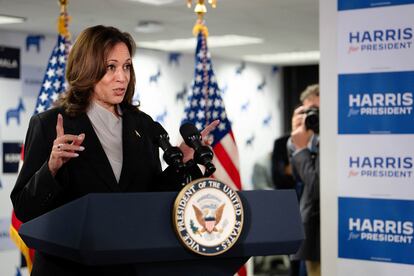Kamala Harris secures majority of delegates required for her nomination as Democratic presidential candidate
In just over 24 hours, the vice president garnered enough support to ensure her place at the head of the ticket before the party’s national convention next month in Chicago


U.S. Vice President Kamala Harris was 1,976 delegates short of securing the Democratic Party’s nomination for the November presidential election. She reached that number Monday night, just under 32 hours after Joe Biden had announced that he was dropping out of the campaign in the face of ongoing doubts about his physical and cognitive abilities, exacerbated by his disastrous performance in the debate against Republican nominee Donald Trump on June 27 in Atlanta.
This backing, which Harris began to swiftly reap even though some voices within the party advocated holding unprecedented “mini-primaries,” from which a consensus candidate would emerge, will allow her to arrive at the Democratic National Convention in Chicago from August 19-22 with the peace of mind that the conclave will prove a mere formality for her anointment.
The count was conducted by the AP news agency, which spent the day working the phones to tally delegate-by-delegate confirmations and then added the names of those who had made their support public. Shortly before 10 p.m. ET, AP confirmed that 2,214 had already closed ranks around Harris. Within minutes, another 60 had added their support.
The news came at the end of a day in which Harris had broken campaign fundraising records with $81 million pledged in just under 24 hours, and her candidacy added 1,000 volunteers. Earlier on Monday, the vice president posted a message on X declaring the “first full day of our campaign.” In the afternoon, she boarded Air Force Two to travel to Biden’s hometown of Wilmington, Delaware, to assure those who had been working on the president’s re-election campaign that she is now the boss and that their jobs are guaranteed.
It now remains to be seen who Harris will choose as her vice-presidential candidate. The names of governors including Roy Cooper (North Carolina), Andy Beshear (Kentucky), Josh Shapiro (Pennsylvania) and J. B. Pritzker (Illinois), as well as Arizona Senator Mark Kelly, are being mentioned.
Memories of the convulsive 1968 convention in Chicago, held a few months after President Lyndon B. Johnson — beset by the unpopularity caused by the Vietnam War — announced that he would not run for re-election remain fresh among Democrats. Between that announcement and the convention, two assassinations took place that turned the country upside down: that of Senator Robert Kennedy, brother of John F. Kennedy, and the Reverend Martin Luther King. Anti-war demonstrations provided a backdrop to the 1968 Democratic conclave, from which Hubert Humphrey emerged as the candidate amid the chaos. At the polls that November, he was easily swept aside by Republican Richard Nixon.
At this summer’s convention, 4,696 delegates will be participating according to Ballotpedia, a website of reference regarding electoral matters in the United States: 3,949 of them are pledged delegates and 747 are automatic delegates, more commonly known as superdelegates, who have their places guaranteed regardless of the results of the primaries.
Democratic Party chairmen from the various U.S. states and overseas and associated territories raced Monday to hold conference calls and face-to-face meetings with members of their delegations to find out how many supporters Harris had accrued. It soon became clear that more than half a dozen of those states had committed to a unanimous endorsement of the vice president.
That number grew rapidly throughout the day. By early morning, the symbolic figure of 1,000 votes had already been surpassed. One of the last states to pledge support was Harris’ home state, California, which is the largest contributor of delegates as it is the most populous in the country.
Harris is running for election with the goal of becoming the first female president in U.S. history. In 2016, Hillary Clinton came within a hair’s breadth of breaking that glass ceiling in a campaign that pitted her against Trump, the same rival the new Democratic candidate will now face.
Sign up for our weekly newsletter to get more English-language news coverage from EL PAÍS USA Edition
Tu suscripción se está usando en otro dispositivo
¿Quieres añadir otro usuario a tu suscripción?
Si continúas leyendo en este dispositivo, no se podrá leer en el otro.
FlechaTu suscripción se está usando en otro dispositivo y solo puedes acceder a EL PAÍS desde un dispositivo a la vez.
Si quieres compartir tu cuenta, cambia tu suscripción a la modalidad Premium, así podrás añadir otro usuario. Cada uno accederá con su propia cuenta de email, lo que os permitirá personalizar vuestra experiencia en EL PAÍS.
¿Tienes una suscripción de empresa? Accede aquí para contratar más cuentas.
En el caso de no saber quién está usando tu cuenta, te recomendamos cambiar tu contraseña aquí.
Si decides continuar compartiendo tu cuenta, este mensaje se mostrará en tu dispositivo y en el de la otra persona que está usando tu cuenta de forma indefinida, afectando a tu experiencia de lectura. Puedes consultar aquí los términos y condiciones de la suscripción digital.








































